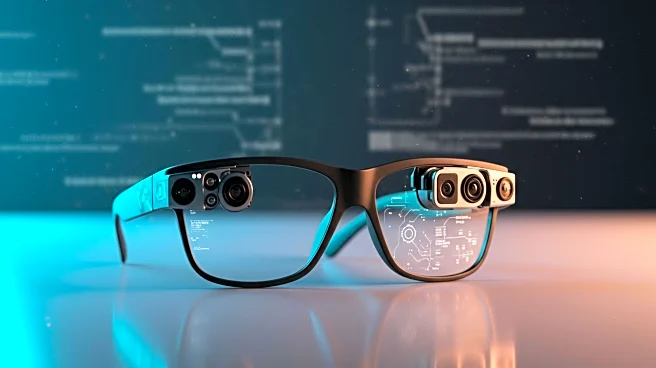What's Happening?
Andy Evans, a 57-year-old man from Larkhall near Bath, has returned to work after being registered blind, thanks to new AI glasses developed by Meta. These glasses, equipped with a camera and speakers, allow Evans to perform everyday tasks such as ordering food and navigating obstacles. The glasses are voice-activated, enabling users to interact with built-in AI technology. Evans, who previously worked at a Morrison's supermarket, now assists others with sight loss at the Sight Support West of England charity. The glasses have significantly improved his quality of life, allowing him to regain independence and employment.
Why It's Important?
The introduction of AI glasses by Meta represents a significant advancement in assistive technology for blind and partially sighted individuals. This innovation not only enhances the quality of life for users but also opens up new employment opportunities, reducing barriers faced by those with sight loss. The technology exemplifies how AI can make tangible impacts, fostering inclusivity and accessibility in society. As the market for smart glasses grows, it holds the potential to transform the lives of many, offering independence and empowerment to a demographic that often faces challenges in daily activities.
What's Next?
The development of AI glasses is still in its early stages, with potential for further advancements in technology and design. As AI continues to evolve, these glasses could become more sophisticated, offering even greater functionality and support. Organizations and charities may increasingly adopt such technologies to aid their clients, while manufacturers could explore partnerships to expand the reach and capabilities of smart glasses. The ongoing progress in AI and wearable technology suggests a future where assistive devices become more integrated into everyday life, enhancing accessibility for all.
Beyond the Headlines
The ethical implications of AI in assistive technology are significant, raising questions about privacy and data security. As these devices become more prevalent, ensuring that user data is protected and used responsibly will be crucial. Additionally, the cultural impact of such technology could shift societal perceptions of disability, promoting greater acceptance and understanding. Long-term, the integration of AI into assistive devices may lead to broader discussions on the role of technology in human life, particularly in enhancing capabilities and overcoming physical limitations.









